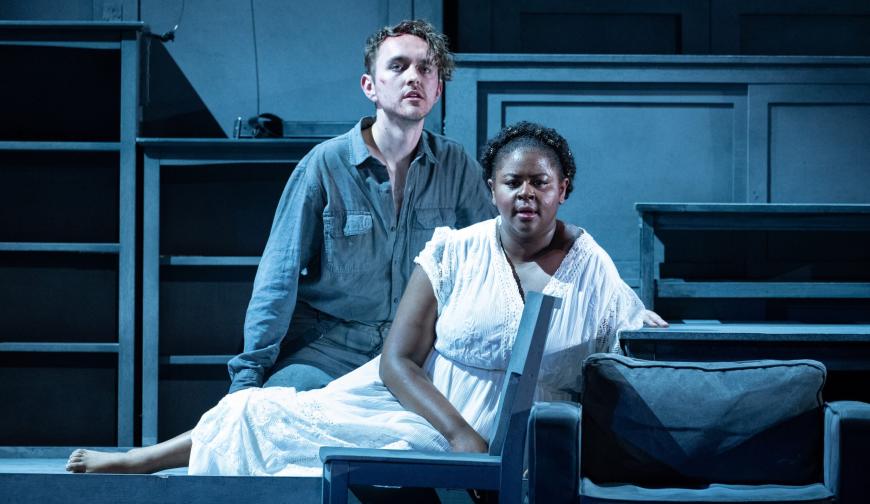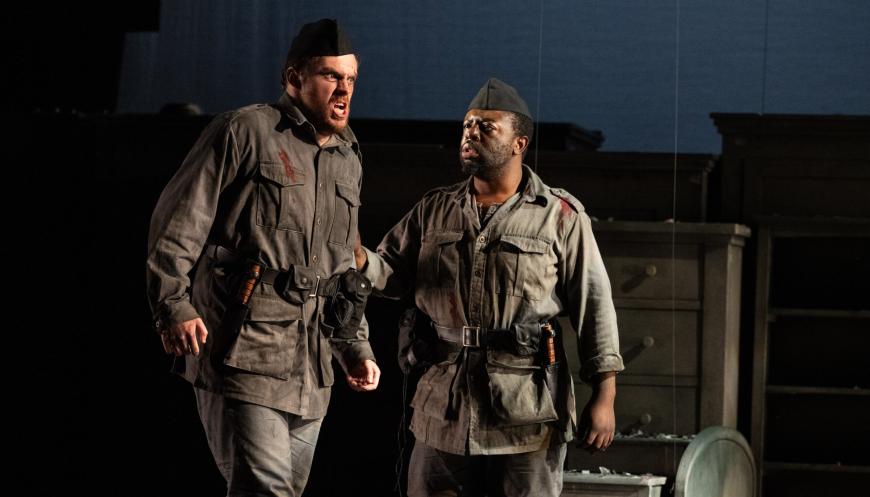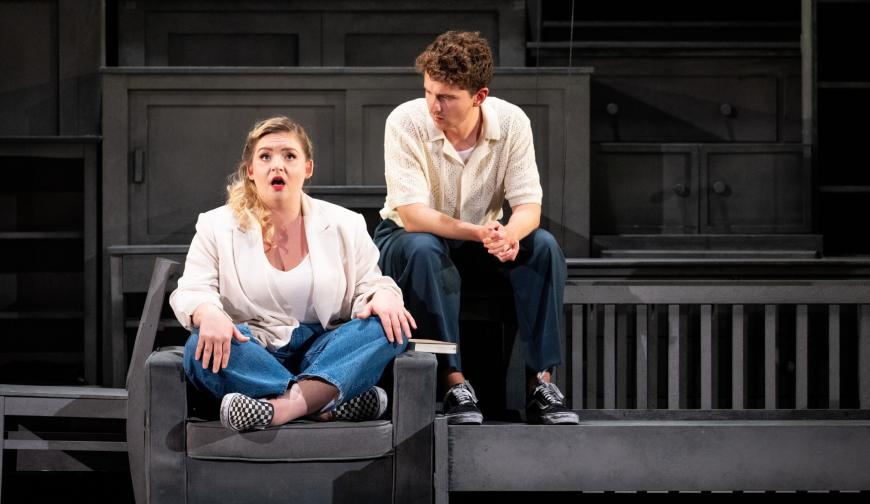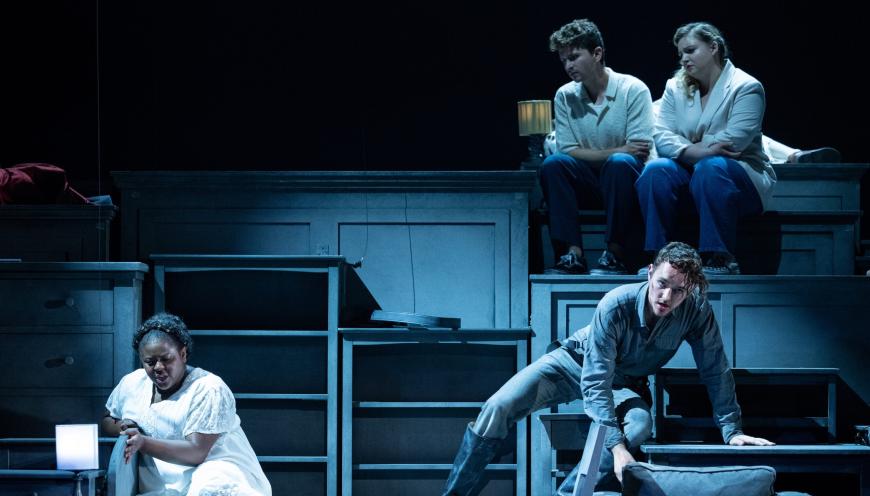
It’s a long road to the Merola Opera Program. Of the 1,300 applicants to the San Francisco Opera-affiliated summer training program, 28 were accepted. At this level, everyone is a superstar, and I can think of no better hands in which to place The Rape of Lucretia, Benjamin Britten’s exasperating, marvelous chamber opera.
It’s Rome, 510 B.C., and the tyrannical Tarquinius Superbus reigns. Our story, though, centers on his son, Tarquinius Sextus, who is concerned less with the war than with his “bevy of listless whores.” We meet his generals, Junius (the mellifluous baritone Cameron Rolling) and Collatinus (bass-baritone James McCarthy, ever commanding), and it’s Collatinus’s wife, Lucretia, after whom Tarquinius lusts. So obsessed is Tarquinius with Lucretia’s purity that he wants to defile it. He demands her hospitality and then rapes her; she kills herself.
Behind the scrim of classical idiom, rape plots feel less fraught. But now that it’s now — Britten’s music does feel that contemporary — standards have changed. Stage the story too graphicly, and it’s trauma porn. On the other hand, treat it too preciously, assault only alluded to as the audience sits comfortably, and the violence is bloodless.

And bloodlessness is probably the easiest way for Lucretia to go wrong. The story is always at a remove, framed by two Choruses (both individual roles) who with a certain pageantry tell the story from some future time. And do they ever tell. The drunk generals can hardly squabble before the Male Chorus explains what you just saw. Parts of the libretto, by Ronald Duncan, are fitting, but the wordy, expository opening of Act 2 is not the only low moment.
“We’ll view these human passions and these years / through eyes which once have wept with / Christ’s own tears,” the Choruses declaim. Human this, human that; each time, the implication is “merely.” Poor Lucretia is a stand-in for Christ, and there’s the sense that this — the crucifixion and rape both — happened just for us: “How slowly time here moves towards the date; / This Rome still has 500 years to wait / before Christ’s birth and death,” even those 30-something years of Christ’s life collapsed into one entity.
The titular action, in fact, is fated in a way that smacks of parody. Lucretia’s low B, which symbolizes her shame, strikes the first time; repeated, it rings hollow. Is the effect wooden on purpose because she’s dazed or because she was only ever a vessel? It’s telling that the Choruses root not for Lucretia to escape or fight back but for Tarquinius not to do it (“Oh, go to bed, Tarquinius”).

Yet it’s by accentuating the affectation that the Merola production (directed by Jan Essinger, with scenic design by Sonja Füsti and lighting by David Robertson) makes the material workable. The curtain opens on an indeterminately shrouded set whose fug is stifling. At one point, the Male Chorus, looking every bit the Boy Scout in his spotless white shirt, climbs to the top, literally looking down on the characters.
Smartly, though, the characters come alive. As the nurse Bianca, mezzo-soprano Simona Genga had impeccable comedic timing, but the revelation was the sorrow with which she shared Lucretia’s shame, seeming barely to hold it together while the oblivious maid (soprano Olivia Prendergast, the ideal naif) nattered away. Soprano Caroline Corrales’s Female Chorus was commanding, and mezzo-soprano Natalie Lewis was a regal Lucretia, her tone rich and her technique seemingly effortless. Together, the women formed a magnificent quartet.
McCarthy’s Collatinus was equally convincing as a magnanimous leader and grieving lover. Baritone Samuel Kidd’s coat was the only thing over the top about his Tarquinius, his villainous portrayal just enough unhinged to be dangerous. But best of all was tenor Chance Jonas-O’Toole’s Male Chorus, his voice so sweet (and accurate on the difficult runs) that you breathlessly awaited his every interjection.

Judith Yan conducted Thursday’s performance at Herbst Theatre, and the orchestra was superb: tight in the thorniest passages, graceful in the domestic scenes. When it’s great, Britten’s music practically plays itself, as in those liminal episodes where the lines, having lost their leading tones, revolve endlessly.
The recitatives are in their own world. Scored conspicuously for piano alone (Merola musician Nicole Cloutier), they sound like quotes from a simpler time, like the Marriage of Figaro aria that makes a cameo in Don Giovanni. Again, the harmonic motion won’t go. The king, it’s told, married the late monarch’s daughter, murdered her, then married her sister (who killed her first husband), and together they throttled her father. All this on one chord, repeated until it doesn’t matter anymore.
After all, what could a dominant-tonic progression be in the 1940s, when Britten wrote the opera, but ridiculous? After the rape, even our plucky Christian commentators deflate, no longer climbing about the sets but watching mournfully from the sidelines. The story hurtling toward its denouement, we increasingly feel the senselessness of it all: “How could Lucretia die while we live?” the ensemble seems to ask. This heathen wishes Britten had stopped here. Before the concluding prayer, the opera is finally, achingly full-blooded.



